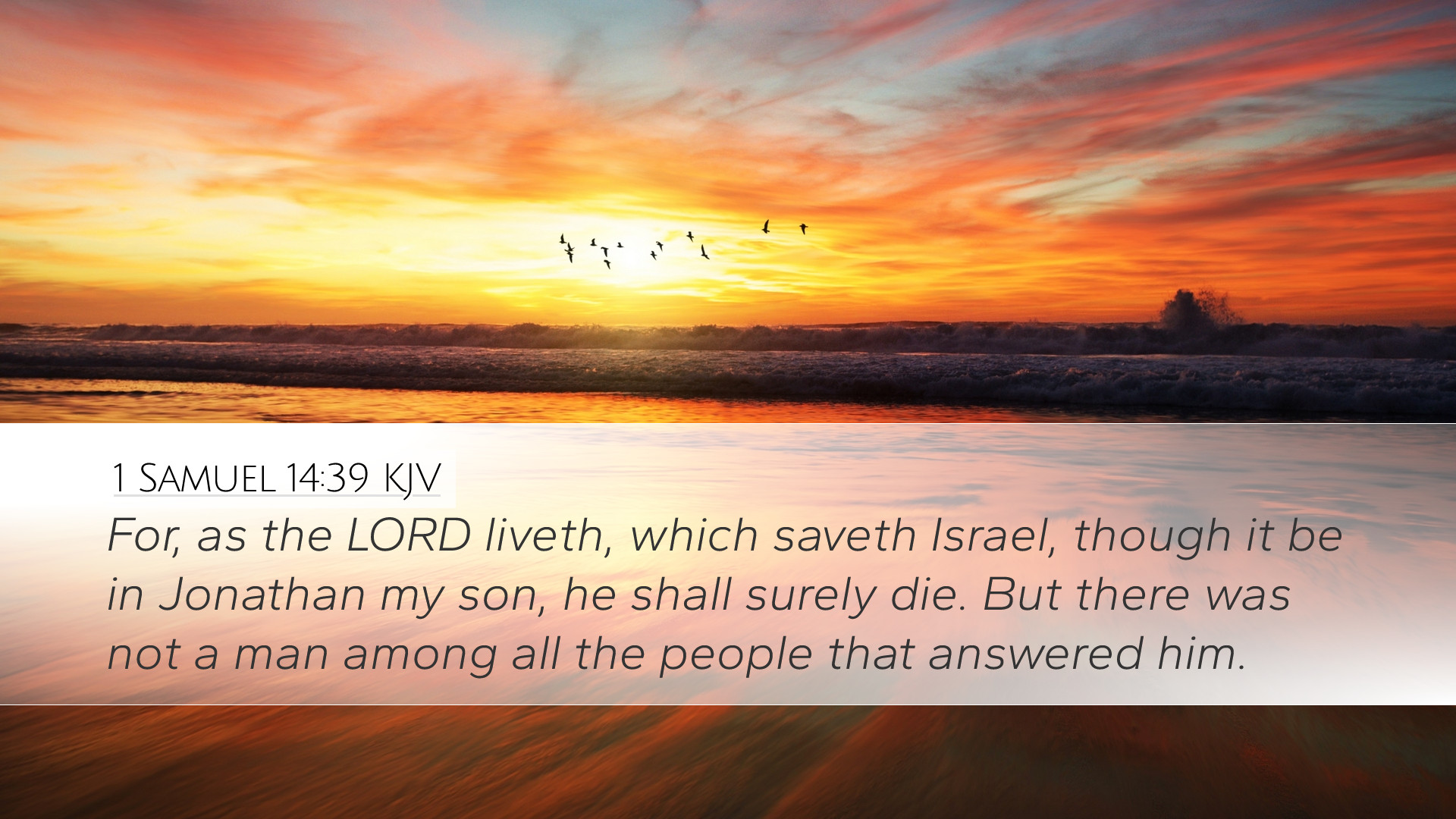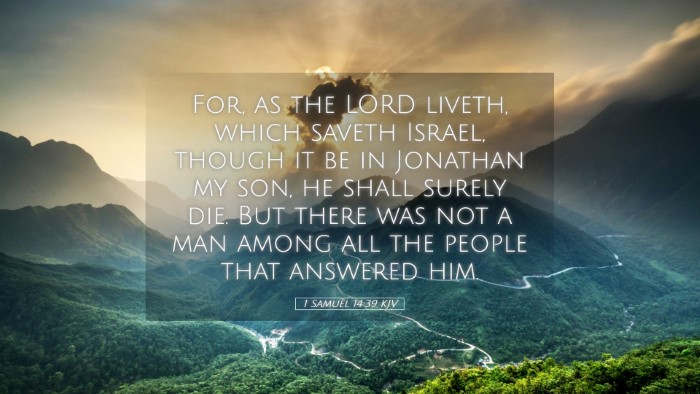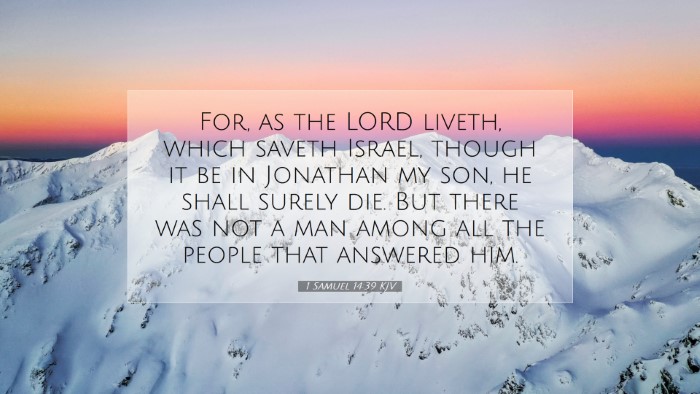Commentary on 1 Samuel 14:39
Bible Verse: "For as the LORD liveth, which saveth Israel, though it be in Jonathan my son, he shall surely die. But there was none that revealed it to him." (1 Samuel 14:39)
Introduction
This poignant verse appears within the context of King Saul's rash oath during a moment of military crisis, reflecting both the weight of leadership and the profound bonds of family. The complexities of divine justice, human folly, and familial loyalty converge, providing fertile ground for theological reflection and personal application.
Contextual Overview
Historical Setting: The events of 1 Samuel 14 unfold during a critical confrontation with the Philistines. Saul, the first king of Israel, issues a hasty oath during the battle, forbidding his troops from eating until evening, which leads to significant consequences.
Jonathan's Role: Unknown to Saul, his son Jonathan had already tasted honey and invigorated himself. This act of disobedience sets up the dramatic tension, as Saul later seeks to confront the disobedience in his ranks, ultimately putting his son at risk.
Insights from Matthew Henry
Matthew Henry emphasizes the gravity of Saul's declaration, noting that it reflects the often precarious interplay of divine justice and human authority. Saul's statement underscores the seriousness with which he views the divine covenant, hinting at the fierce commitment to uphold God's standards, even to his own son's detriment.
- God's Sovereignty: Henry notes that Saul's recognition of the Lord's sovereignty is commendable, yet misplaced. The king acknowledges that the Lord may choose to save Israel even through Jonathan, which indicates a flickering awareness of the divine plan.
- Blindness to Consequences: He points out the tragic irony that Saul's attempt to uphold righteousness through a foolish oath leads him to threaten the very life of Jonathan, a man deserving honor, not death.
- Divine Obscurity: Henry also emphasizes the fact that none dared to reveal to Saul that it was his beloved son who had transgressed his command, showcasing the tension between fear of the king and the truth.
Insights from Albert Barnes
Albert Barnes offers a nuanced reading of this verse, highlighting the moral conflicts faced by Saul as a leader. He draws attention to the dangers of overreach in authority, revealing how a leader's decisions can lead to dire repercussions.
- The Nature of Vows: Barnes discusses the binding nature of vows in the Old Testament context, suggesting that Saul's well-intentioned, yet ill-considered vow underscores a critical lesson in leadership—vows must align with justice and mercy.
- Jonathan as a Foil: By contrasting Jonathan's actions with Saul's, Barnes illustrates the theme of true bravery and loyalty to God over loyalty to flawed human authority. This reflection provides a teachable moment about moral courage in the face of authoritarianism.
- The Role of Providence: Barnes also notes the providential circumstances surrounding this event, indicating that God's plan would ultimately prevail, irrespective of human errors and misjudgments.
Insights from Adam Clarke
Adam Clarke's commentary delves into the theological implications of Saul's proclamation, emphasizing the broader themes of sin, forgiveness, and divine intervention.
- Human Fallibility: Clarke notes how Saul's actions demonstrate the unpredictability of human judgment when faced with stress and fear. His desire to protect his kingdom blinds him to the value of his son's life.
- Divine Mercy vs. Justice: He contrasts the severity of Saul’s oath with the mercy of God, suggesting that God’s plans transcend human folly, ensuring that life—especially that of a faithful servant like Jonathan—is preserved.
- Call to Action: Clarke also emphasizes the obligation of leaders to seek divine guidance in their decisions, reinforcing the idea that prayer and seeking the Lord's wisdom are paramount in times of crisis.
Theological Reflections
This narrative invites deeper theological consideration about the nature of authority, the perils of impulsive decisions, and the importance of discernment in leadership. The lesson encouraged through 1 Samuel 14:39 is multifaceted and far-reaching.
- The Nature of Leadership: Leaders are called to balance decisiveness with wisdom. Saul's careless vow illustrates how hasty decisions can lead to irreparable harm.
- The Role of Family and Loyalty: In the face of authority, the bonds of family can become strained, posing ethical dilemmas. This verse invites us to ponder our loyalty to family versus our commitments to our communities and principles.
- Understanding Divine Will: The episode encourages believers to recognize that human missteps cannot thwart God's plans. Jonathan's survival amidst a deadly vow underscores God's ultimate control over life and death.
Applications for Pastors, Students, and Scholars
1 Samuel 14:39 offers rich material for pastoral teaching, academic study, and personal reflection:
- Practical Preaching: Sermons can draw from this narrative to highlight the importance of seeking God's will, the necessity for leaders to surround themselves with wise counsel, and the imperatives of mercy in leadership.
- Ethical Discussions: The text serves as a foundation for ethical discussions in theology classes, focusing on the responsibilities of leaders and the complexity of human relationships in contexts of power.
- Personal Reflection: Individuals are encouraged to reflect on their own vows and commitments, prompting a self-examination about areas where they may have acted out of pressure rather than divine guidance.
Conclusion
Overall, 1 Samuel 14:39 presents a narrative layered with complexity and moral depth. The consequences of Saul's oath provide a sobering reminder of the responsibilities leaders carry and the weight of their words. Through the commentary of noted theologians, this verse compels all readers—pastors, scholars, and laypeople alike—to examine their callings and the moral fabric that binds them in relationships across all spheres of life.


